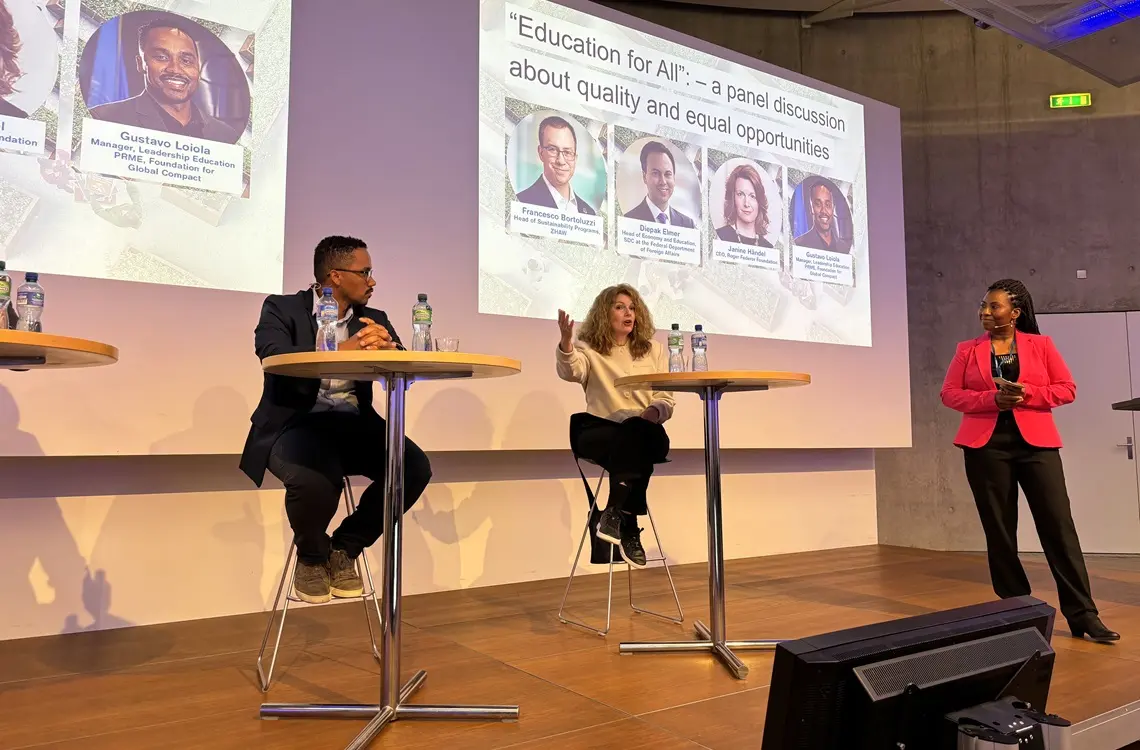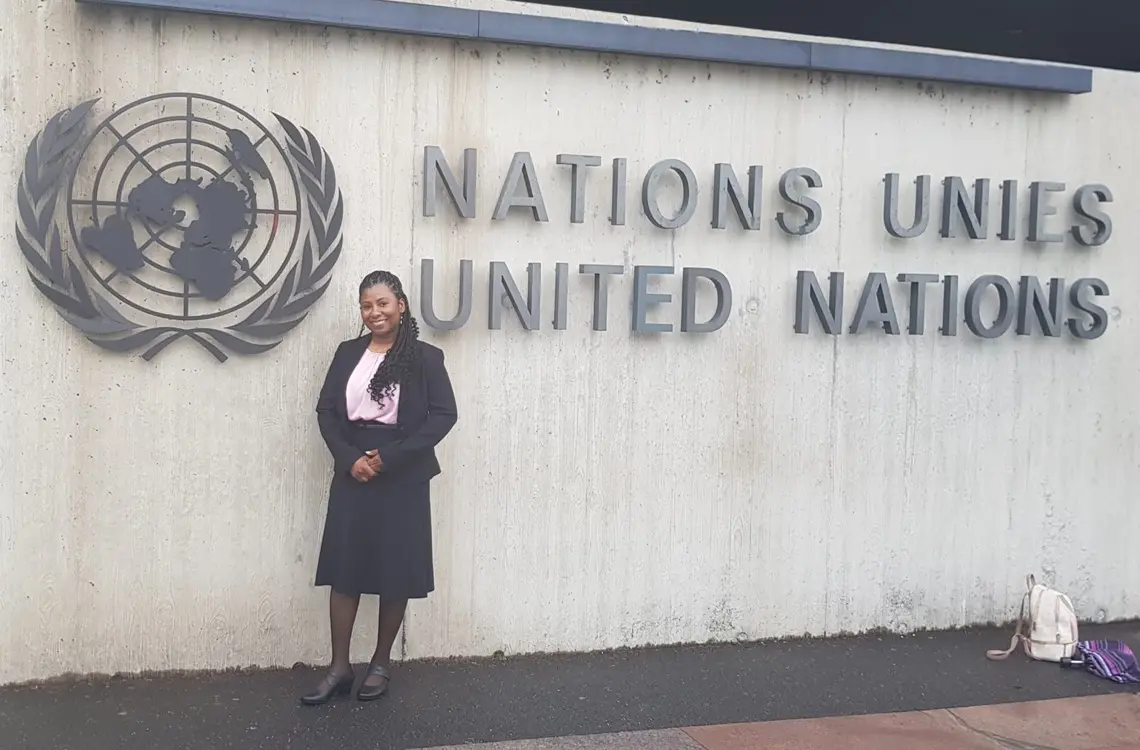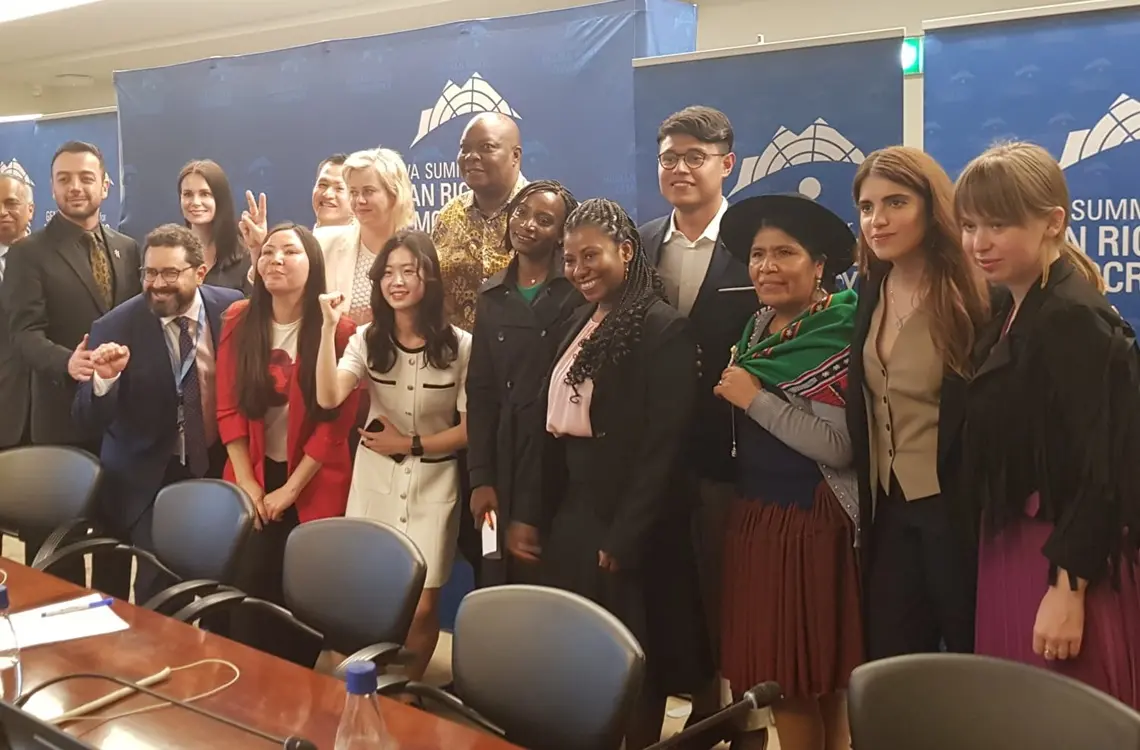The Global Pulse: Vera Baltisser
Vera Baltisser is studying for a Master's degree in International Business at the ZHAW School of Management and Law. Her path is a very special one: she is a mother and was already in the middle of her working life before she returned to university. In this interview, Vera shares her career with us, talks about her Master's project in Ghana and tells us about the role she recently played at the United Nations.

Vera, tell us about your experience as moderator of Sustainability Day at the ZHAW School of Management and Law. How has it shaped your understanding of sustainability in business?
Moderating Sustainability Day was an enriching experience for me. My understanding of sustainability has deepened thanks to exchanges with specialists such as Alexandra Grammenou and the students who took part. I was particularly honored that my idea for a panel discussion on quality education in the Global South was accepted and that I was given the responsibility of researching and contacting potential panelists. We were able to put together a great panel, including Dr. Janine Händel, CEO of the Roger Federer Foundation, Diepak Elmer, Head of Business and Education at the Federal Department of Foreign Affairs (FDFA), Dr. Gustavo Loiola, Manager of the Leadership Education (PRME) Foundation for the Global Compact, and Dr. Francesco Bortoluzzi, Head of Sustainability Programs at the ZHAW Rector’s Office. Moderating the panel discussion was one of the most remarkable experiences of my life and provided high-quality exchanges between experts on inequality in global education. My key takeaway from the discussion is that both corporations and individuals can play a significant role in supporting equal opportunities in the quality of education in the Global South, which aligns with the United Nations Sustainable Development Goals – particularly SDG 4 concerning quality education.
In addition to your commitment to Sustainability Day 2024, you are also a student of the ZHAW Master’s in International Business and are currently working on your thesis about access to quality education. Can you tell us more about your project? What are the critical insights from your research?
My supervisor, Prof. Petra Barthelmess, made it possible for me to approach the topic as I wanted. She really brings out the best in her students and encourages our creativity. My research addresses “Quality Education for Developing Communities in Ghana” and focuses on the Alavanyo community in the Volta region of Ghana. I plan to capture the community’s perspective on quality education, identify challenges, and determine how they can access quality education. The results of my research will be used to set up an NGO to support the people of Alavanyo on this path. Anything that proves successful will later be used for other communities in Ghana and beyond. In terms of essential findings, my research is not yet complete. However, I have already noticed a connection between the lack of quality education in Alavanyo and a recurring conflict with another village called Nkonya. The dispute began at the beginning of the 20th century and has already seen several fatal clashes between young people from the two communities. I believe a lack of educational opportunities can cause young people to lose focus on their studies and personal development, and this feeds the cross-generational tension. I will discover more during my field research in Alavanyo this summer.
Being 39 years old, I thought it was too late to begin this new journey because we assume all students are young people with fewer life experiences and personal ties. But everything changed when I injured my wrist and was unable to do my job. That was a turning point for me – the moment I had been waiting for. If I couldn’t use my hand properly, I would have to use my brain all the more.
Do you think your NGO project for quality education in Ghana will benefit the local community there? What specific challenges do you foresee, and how do you plan to overcome them?
My original idea was to establish the NGO as a bridge for companies in Switzerland to support quality education in Alavanyo. This would also have aligned with UN SDG 4, in which companies are committed to improving educational opportunities as part of their social responsibility mandate. After a lot of literature research, interviews with experts, and an examination of best practice examples as presented by the Roger Federer Foundation, I adapted the goal of the planned NGO. This will now consist of empowering the inhabitants of Alavanyo to gain and maintain access to quality education for themselves. In this way, the community can adapt educational offers to their specific needs and maintain quality education long-term with limited support from the Global North. One of the challenges is raising funds to launch the joint project, but I am confident that foundations here in Switzerland will want to support a small, fledgling NGO like mine that is based on thorough research and solid groundwork. I have already received some grants from the Noemi Rusch foundation in support of my research. I am hopeful that further supports and collaborations from similar organisations would come in to propel me towards my goal. Of course, the social conflict I referred to earlier is a complex issue that cannot be resolved overnight or solely by me, but every success story begins in a small way. For example, my NGO may be able to provide practical help for young people or create a community refuge for those who need more education, counselling, and life opportunities.

What insights have you gained from the Connoppo Business Project at the ZHAW School of Management and Law, which dealt with entrepreneurship and management in an environment as close to reality as possible?
First of all, it was great to work on a project involving an NGO founded by a former student of the MSc in International Business – the same degree program I am currently doing. Marco Wijeratne is the brains behind Connoppo. This project taught me that the entrepreneurial journey requires a good team and that a business should be run according to the “Kaizen” approach – continuous improvement is crucial for successful management. You also have to build trust within your team, respect the faith your clients have in you, make a positive impact through your company, and be transparent about your goals.
What sets you apart from other students is that you are a mother and have resumed your studies after a ten-year break. What was the driving force behind that?
I have always loved studying and valued education. I knew I would return to university at some point, but as the years went by and I moved further away from academia, I became immersed in the world of work. However, my friends often said I should go back to university because they could see how committed I was regarding business and international relations. Being 39 years old, I thought it was too late to begin this new journey because we assume all students are young people with fewer life experiences and personal ties. But everything changed when I injured my wrist and was unable to do my job. That was a turning point for me – the moment I had been waiting for. If I couldn’t use my hand properly, I would have to use my brain all the more.
What challenges did you expect, and what challenges did you actually experience when you returned to the academic world?
Initially, I was afraid of failing because of my age, and the fear of being left out worried me a little. To my surprise, however, one thing led to another, and I achieved several significant goals by networking with people from management and education. I want to share this story with women my age and say it’s never too late to pursue something you set your heart on.

You were also chosen to attend the opening UN Summit on 14 May ahead of the 16th Geneva Summit on Human Rights and Democracy the following day. Tell us something about this experience.
Alexandra Grammenou inspired us not only to pursue our individual career paths but also to be and remain open to human rights issues. She didn’t know then that I would take her advice to heart. Conversely, I had no idea I would be selected for an ambassadorial role on behalf of our university and department at the UN inaugural summit. Originally, I just wanted to sign up for the Human Rights and Democracy Summit on 15 May but I saw on the event website that they needed volunteers to help out. So I put my name down. A UN Secretariat staff member immediately contacted me for an online interview about my interest in volunteering and the following steps if I was successful. During the conversation, I found out that I might also have the chance to attend the UN Human Rights and Democracy Summit the day before it officially opened. When I registered via the link provided, it was as a student of the ZHAW School of Management and Law to represent the SML at this great event. Without our university and our department, I would probably not have been able to achieve this milestone or have this opportunity. I took part in both programs, and they were some of the best experiences I’ve ever had. I was also able to make many professional contacts at the UN.
Get more insights into ZHAW International Business:
Continuing Education International Management
BSc in International Management
MSc in International Business
Further Zoom In articles